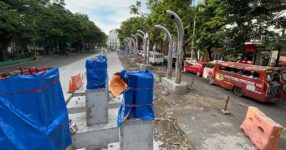
Lawmaker pushes to end CBRT, other foreign-funded projects
SEN. Nancy Binay has urged the Department of Transportation (DOTr) to consider terminating foreign-assisted projects, including the Cebu Bus Rapid Transit (CBRT), due to mismanagement and right-of-way issues.
Cebu City Councilor James Anthony Cuenco expressed support for this move, even if it means scrapping the entire CBRT project.
During a Senate Finance Subcommittee hearing on Tuesday, Sept. 10, 2024, Binay suggested that it might be time to terminate problematic official development assistance projects to prevent further losses.
“We have foreign-assisted projects that we need to decide if these will be continued or not. The bleeding is continuous in these projects. Perhaps, it is high time that we terminate these projects and cut our losses,” Binay said in a mix of Filipino
In response, Transportation Secretary Jaime Bautista acknowledged that the CBRT has faced delays due to complaints from the Cebu Provincial Government but assured that the project would be operational before the end of the year, except for the section in front of the Capitol building.
CBRT project is being financed by loans from the World Bank, Clean Technology Fund (CTF), and Agence Française de Développement (AFD), along with counterpart funding from the Philippine government.
The total project cost is estimated at $228.5 million, with the World Bank providing $116 million, CTF providing $25 million, AFD providing $57.5 million, and the Philippine government providing counterpart financing of $87.5 million.
The World Bank and AFD loans were originally scheduled to expire in June 2023 and March 2023 respectively. However, the World Bank has extended the closing date of the CBRT project loan by three months to Sept. 30, 2023, to allow the government to request loan restructuring.
In Philippine peso, the total cost of the project is over P28 billion.
For his part, Cuenco, who has been advocating against the CBRT project for the past year, agreed with the Senate’s call, stating that unless the issues he raised in previous privilege speeches are addressed, the government should admit its shortcomings and scrap the entire project.
Cuenco dismissed concerns about potential repercussions from the World Bank, citing instances where the National Government canceled infrastructure projects without consequences, including the north rail project, the Metro Manila BRT, and the e-trikes project.
Cuenco believes that terminating the CBRT would have a positive impact on Cebu residents, as it would allow the government to focus on a comprehensive mass transport solution that combines land-rail transit, mass rapid transit, subway, and expressways, as outlined in the National Economic and Development Authority Metropolitan Cebu Comprehensive Mass Transport action plan.
However, Cuenco said that, while he is not a lawyer, he believes there is no legal remedy for the local government unit to gain authority over a national project, but Congress could influence the decision through an appropriate resolution if requested by the local government.
Cuenco earlier said that the CBRT project would not meet its scheduled completion due to ongoing issues, which he emphasized in a privilege speech last Feb. 21.
He suggested allowing the completion of CBRT Package 1, then observing its partial operations to determine the project’s viability.
The Cebu BRT, a flagship initiative of the DOTr, spans 35.28 kilometers, with the first phase covering the route from Osmeña Boulevard to Cebu South Bus Terminal. It is expected to serve around 60,000 passengers daily in its first year of operation, potentially increasing to 160,000 once fully operational. However, the project’s completion has been delayed to 2027.
Attempts to reach BRT project manager Norvin Imbong for comments were unsuccessful as of press time. / JPS



